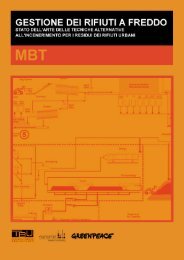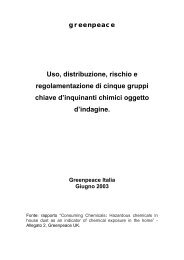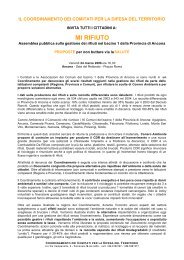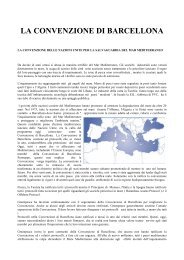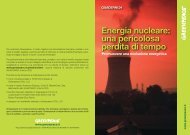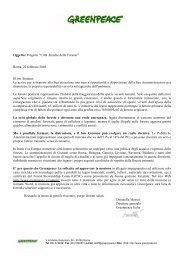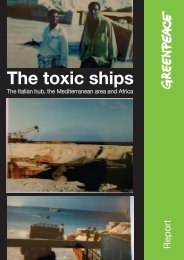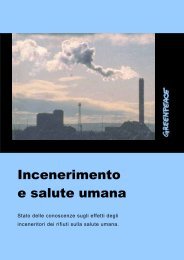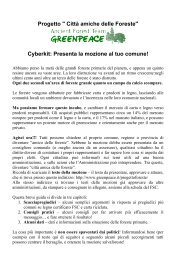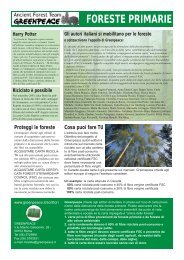Zero Waste by Robin Murray, Greenpeace Environmental Trust 2002
Zero Waste by Robin Murray, Greenpeace Environmental Trust 2002
Zero Waste by Robin Murray, Greenpeace Environmental Trust 2002
Create successful ePaper yourself
Turn your PDF publications into a flip-book with our unique Google optimized e-Paper software.
• the exemption from business rates;<br />
• the provision of normal capital allowances on all<br />
forms of fixed investment.<br />
The sums involved, estimated at £1 billion over seven<br />
years, dwarfed those provided for recycling. 82 In cases<br />
where there was an opportunity to fund intensive<br />
household recycling, through the Landfill Tax compliance<br />
scheme or the packaging regulations, local authorities and<br />
recycling collection were marginalised.<br />
(iii) planning<br />
The process of obtaining the necessary planning perm i s s i o n<br />
and consents has been a significant hurdle for the<br />
c o n s t ructors of incinerators. The government used two<br />
main approaches to ease the process:<br />
• it encouraged local authorities to include EfW in their<br />
waste local plans, (current planning guidance, PPG 10,<br />
specifies that local authorities should make provision<br />
for all forms of waste treatment, a clause frequently<br />
quoted in planning inquiries in support of incinerator<br />
applications); 83<br />
• there has been persistent pressure for the<br />
environmental and health impacts of an incinerator<br />
application to be dealt with solely <strong>by</strong> the Environment<br />
Agency under the IPPC regulations, a move which<br />
leaves them less open to public scrutiny than in the<br />
customary planning process.<br />
Throughout the 1990s there was strong official support<br />
for a revival of incineration. In 1993, the Royal<br />
Commission on <strong>Environmental</strong> Pollution advocated the<br />
increased use of incineration with energy recovery for the<br />
disposal of controlled waste, and the 1995 White Paper<br />
endorsed these conclusions. 84 The 1999 Consultation<br />
Paper, ‘A Way With <strong>Waste</strong>’, although relegating EfW<br />
below recycling for the first time in the waste hierarchy as<br />
the result of political pressure, nevertheless stated that<br />
EfW, ‘will need to play a full and integrated part in the<br />
local and regional solutions’. 85 It underlined the<br />
importance of the ‘integrated approach’ and the need to<br />
include a mixture of waste management options and<br />
‘avoid over-reliance on a single waste management<br />
option’. 86<br />
With the focus on re-establishing incineration, the DETR<br />
and the DTI had little time and less money to advance<br />
recycling. In using public funds and directives to level the<br />
economic playing field between landfill and incineration,<br />
it tilted it further away from early stage re c y c l i n g ,<br />
relative to incineration. The resulting poor perf o rm a n c e<br />
of recycling confirmed the view of the limitations of<br />
recycling and gave even greater significance to altern a t i v e<br />
disposal options. In this sense the policy, financial and<br />
planning frameworks all combined towards a selffulfilling<br />
recycling pessimism, leading to the curre n t<br />
dominant option being that of ‘inflexible integration’.<br />
Changes in political climate<br />
Early in 2000, the politics of waste began to change.<br />
Until then, local campaigns against incinerators and in<br />
favour of recycling had remained local. They re c e i v e d<br />
wide coverage in their local press, but scarcely any<br />
n a t i o n a l l y. In March 2000, the Guardian carried the first<br />
coverage of the ash scandal at the Byker incinerator in<br />
Newcastle. In May the results of the independent testing<br />
of the ash and allotment soils on which the ash had been<br />
s p read were announced, and filled the national press.<br />
Since then not only the broadsheets, but BBC radio and<br />
television have covered waste stories, from alleged<br />
c o rruption in the Landfill Tax Credit scheme and the<br />
continuing revelations about Byker and Edmonton ash,<br />
to the growing number of anti-incinerator campaigns in<br />
S u rre y, Sussex, Kent, Essex, Cornwall, Kidderm i n s t e r,<br />
Wrexham, Liverpool, Lancashire, Sheffield, Humberside,<br />
Newcastle and Neath Port - Talbot.<br />
124<br />
<strong>Zero</strong> <strong>Waste</strong><br />
125



